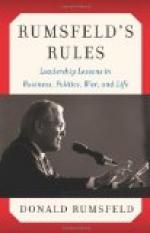the summer, and therefore every column is dependent
for its food and ammunition upon a line of railway,
which a handful of Boers may at any moment and at
any point in its hundreds of miles temporarily interrupt.
These considerations should be kept in view not merely
in reviewing the conduct of the campaign and the work
of the British generals, but above all in the preparations
now being pushed forward throughout the Empire.
The project of a Corps of Imperial Yeomanry is a step
in the right direction. If it is to contribute
to success due importance must be given in the selection
of the men to straight shooting, without which good
riding can be of little use. Equally important,
too, is the selection of leaders. The home-trained
officer, however good, must not be exclusively relied
upon. Every local war we have had, beginning with
the campaigns against the French in America which led
to the Seven Years’ War, has proved the necessity
of giving full scope to local experience and local
instincts. Old and new instances abound of the
way in which the neglect of the feelings of colonists
and of their special qualifications for special work
rankles in breasts of a colonial population.
If, then, the new Yeomanry are to be of real service
in South Africa and to deserve the name Imperial a
proportion of their officers of all grades should
be men of colonial birth and colonial experience.
The South African troops now at the front have done
fine service, and some of their officers might be
promoted and transferred to the new Yeomanry, their
places being filled by promotions in the corps which
they leave. The preparation of transport ought
not to lag behind the despatch of reinforcements.
At the earliest possible moment the attempt should
be made to send into the enemy’s territory a
great raid of horsemen, on the model of the raids
of the American Civil War. A body of several
thousand mounted men should march right through a part
of the Free State, living upon the country, consuming
every scrap of food, and clearing out every farm of
all its provisions. If that operation can be
repeated two or three times a belt of country will
be left across which the Boers without transport will
not be able to move, while the British, properly equipped,
will not be delayed by its exhaustion.
The plan adopted by the authorities for raising a
volunteer contingent is more significant for the future
of the National defences than has yet been realised.
Each volunteer battalion is to supply a company to
its line battalion in the field and to keep a second
company ready at home in reserve. Thus the volunteer
force is to be used by being absorbed into the Army.
That leads inevitably to the amalgamation of the volunteers
with the regular Army, and is a death-blow to the specific
character of each of them. It means that henceforth
the British Army, like other armies, will be homogeneous,
containing no other categories than men with the colours
and men in reserves, classified according to the immediacy




